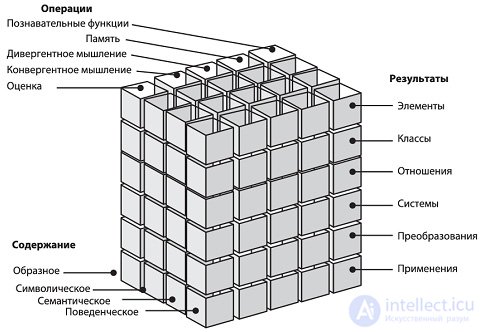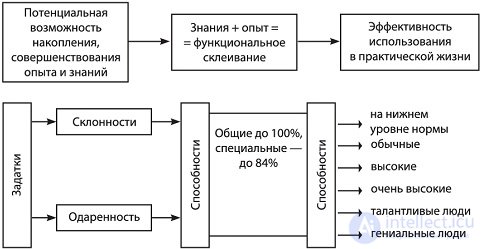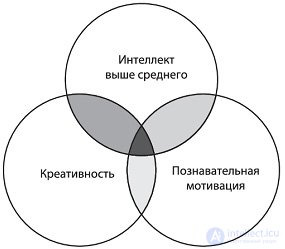Lecture
Intellect (from lat. Intellectus - understanding, cognition) - general abilities to know, understand and solve problems. The concept of intelligence combines all the cognitive abilities of an individual: sensation, perception, memory, representation, thinking, imagination.
Intellect is the ability of the system to create (in the first place, heuristic) programs for self-study to solve problems of a certain class of complexity and to solve these problems.
Under the modern definition of intelligence refers to the ability to implement the process of knowledge and effective problem solving, in particular when mastering a new circle of life tasks. Therefore, the level of intelligence can be developed, as well as to increase or decrease the efficiency of human intelligence. Often this ability is characterized in relation to the tasks encountered in a person's life. For example, in relation to the task of survival: survival is the main task of a person, the rest for him is only arising from the main, or to tasks in any field of activity.
According to academician N.N. Moses, intelligence is, first of all, goal-setting, resource planning and building a strategy for achieving a goal.
There is reason to believe that animals have the beginnings of intelligence, and already at this level their intelligence influenced and influenced the evolution of animals through the mechanisms of goal setting and goal achievement. The study of the intelligence of animals is engaged in a relatively young area of science - cognitive ethology.
Intellect is the ability to plan, organize and control their actions to achieve the goal, taking into account the coincidence of truth and good. Please note that this definition also includes devices with artificial intelligence. Intellect can be updated only in the information space. Each activity forms its own information space. The method of its formation and use is based on the principles of the organization of the intellect. The principles of organizing the insertion of new information into the information space, methods of storage and reproduction also correspond to the peculiarities of the work of the intellect, namely the organization of memory. Therefore, the information space is also an intellectual space, because it already contains the principles of planning, organizing use and stage-by-stage control to achieve the goal.
The influence of the intellect goes beyond the life of one person. The development of intelligence in Homo sapiens distinguished him from the world of animals and a flock of the beginning of the development of society, and then of human civilization. Intellect as an ability is usually realized with the help of other abilities. Such as the ability to learn, learn, think logically, systematize information through its analysis, determine its applicability (classify), find links, patterns and differences in it, associate it with the like, etc.
The essential qualities of human intellect are inquisitiveness and depth of mind, its flexibility and mobility, consistency and evidence. Specify:
The different content of the activity requires the development of certain intellectual abilities of the individual. But in all cases, the individual's sensitivity to new, actual problems, to trends in the possible development of the situation is necessary. Indicator of the development of intelligence here is the disconnection of the subject by external restrictions, his lack of xenophobia - the fear of the new, unusual.
The essential quality of an individual's mind is the anticipation of the possible consequences of the actions taken by him, the ability to prevent and avoid unnecessary conflicts. One of the main features of a developed intellect is the ability to intuitively solve complex problems.
The development of individual qualities of the intellect is determined both by the genotype of this species and the breadth of its life experience.
In totalitarian social regimes, conformal individuals form the so-called “target thinking” - the sphere of the individual’s thinking narrows to extremely limited everyday limits, intellectual infantilism is widely spread, and among intellectuals - contemplativeness. In group thinking, common stereotypes, patterned orientations, schematized matrixes of behavior begin to prevail. There are deformations in the content of the intellect. Possible deformation in the structure of intelligence, in its organization. The negative quality of the intellect is the rigidity of thinking - its inflexibility, prejudice to the phenomenon, the exaggeration of his sensual impression, adherence to the template estimates.
So, intelligence is a very common mental capacity, which includes the ability to draw conclusions, plan, solve problems, think abstractly, understand complex ideas, learn quickly and learn from experience. This is not just studying books, narrow academic knowledge or skills to pass tests. On the contrary, intelligence reflects a wider and deeper ability to learn about the world, to understand the essence of things and to figure out what to do in a given situation.
And here is another opinion: intellect is the ability of a person to search, perceive, analyze, systematize and effectively use information to achieve a goal. Only a narrow-minded, limited person accumulated by an individual, unsystematic. unparsed and unapplied information can be perceived as the intellect of an individual.
At the beginning of the XX century. Charles Spearman showed that if a person solves one problem well, then he is successful in solving others, i.e. that all intellectual abilities are statistically related. Spearman introduced the " g factor " of general intelligence, showing the effectiveness of all cognitive tasks. In practice, it turned out that the “ g factor ” is difficult to measure directly. However, on its basis, it was possible to formulate values that can be measured and which are approximate measures. g . One of these parameters is the intelligence quotient (IQ).
Psychologist James Flynn first conducted extensive research in the field of dynamics IQ in different countries of the world over a long period has shown that this coefficient has continuously increased for 50 years (the Flynn effect).
The level of intelligence refers to the level of development of intellectual abilities with respect to age. People with insufficient intelligence have oligophrenia - congenital dementia. In addition, there is acquired dementia - dementia.
There are three degrees of congenital dementia:
It should be borne in mind that there are certain common functional disorders of a person’s cognitive ability, which may even lead to brain atrophy. Because of them, a person is aware of only a small part of reality.
The factors that violate our mental abilities are:
Social intelligence - the ability to correctly understand the behavior of people. This ability is necessary for effective interpersonal interaction and successful social adaptation.
The term “social intellect” was introduced into psychology by E. Thorndike in 1920 to denote “foresight in interpersonal relations”. Many famous psychologists have contributed to the interpretation of this concept. In 1937, Mr. Allport linked social intelligence with the ability to express fast, almost automatic judgments about people, to predict the most likely human responses. Social intelligence, according to G. Allport, is a special “social gift” that provides smoothness in relations with people, the product of which is social adaptation, and not the depth of understanding.
The creator of the first reliable test for measuring social intelligence was J. Guilford. According to the concept of Guilford, social intelligence is a system of intellectual abilities that is not dependent on factors of general intelligence. These abilities. as well as general intellectual, it can be described in the space of three variables: content, operations, results. J. Guilford singled out one operation - cognition (C) and focused his research on cognition of behavior (CB). This ability includes six factors (Fig. 9).
Cognitive Behavior Elements (CBU) is the ability to isolate from the context verbal and non-verbal expression of behavior (an ability close to isolating a “figure from the background” in Gestalt psychology).
Cognition of classes of behavior (CBC) - the ability to recognize common properties in some stream of expressive or situational information about behavior.
Cognition of attitudes ( CBR ) - the ability to understand the relationship that exists between units of information about behavior.
Cognition of behavioral systems ( CBS ) - the ability to understand the logic of the development of whole situations of interaction between people, the meaning of their behavior in these situations.
Cognition of behavioral transformations (CBT) - the ability to understand the original meaning of similar behavior (verbal and non-verbal) in different situational contexts.
Knowledge of Behavior Results (CBI) - the ability to anticipate the consequences of behavior, based on available information.

Fig. 9. The structure of intelligence by J. Guilford
As well as to temperament, it is impossible to apply estimated and informative characteristics to the intellect. Intellect can not be "decent", "moral", "evil", "good." All these definitions are associated with the subject's personal orientation, characterizing the content side of his world view, value orientations, and ethical command. It can be said that temperament is a characteristic of the instrumental sphere of individuality from the side of activity, energy, and intellect from the capabilities of the subject, the ability to dispose of this energy.
So, speaking about the study of the intellect and abilities of a person, for many years I had to note that the monopoly in their study belonged to testerology.
For the first time F. Galton spoke about the existence of individual differences in mental (intellectual) abilities. But he identified intellect with congenital psycho-physiological functions (reaction, sensitivity, etc.).
In 1905, French scientists A. Vine and T. Simon - in connection with government requests to find a way to distinguish incapable children - created the first series of tests (30 assignments) that help to some extent determine something like abilities:
IQ = (Mental Age / Chronological Age) x 100%,
where mental age is the average age of children who solve the same tasks as the subject (that is, if a 6-year-old child solves tasks for 8-year-olds, his mental age is 8 years).
Vine and Simon first put forward the idea of the influence of the environment on the peculiarities of cognitive development; however, in their concept, intelligence was limited only by the level of characteristics studied (that is, its reproductive side).
Today, there are still two main trends in the development of ideas about intelligence:
However, it is worth noting the existence of a certain crisis of the testological approach to the study of intelligence: despite the powerful methodological support for the study of intellectual abilities, testology could not produce an acceptable concept of intelligence. In addition, adherents of the views on intelligence as a single structure came to a paradoxical conclusion about a variety of different, not always dependent on each other, abilities, and adherents of the idea of multiple intellect were convinced that there was a common beginning to all manifestations of intelligence. On closer examination, it turns out that the content of tests often replaces the concept of intelligence with either a general level of educational and cultural development (besides, the assessment of the “correctness-incorrectness” of solving tasks depends on the culture), or the ability to learn, which, however, identical to the intellect). In addition, low test results are associated with anxiety, aggressiveness, introversion, i.e. it is possible to substitute the measurement of intellectual abilities by measuring the formation of individual mechanisms of self-regulation.
In domestic psychology, the intellect is considered as a component of individuality associated with personal characteristics (studies of the connections of the intellect with emotional-volitional characteristics, socio-economic conditions, etc.).
B.M. Teplov: “... ability is an individual property that is manifested differently in different people. This is a variable. It can be measured. Ability is a property associated with the successful development / implementation of activities. This is a success. It can be measured ... ".
Indeed, intelligence must be viewed as a complex multi-level structure:
In the past, as we have seen, quite a few definitions of intelligence have been proposed. Of these, the most common was the definition given by K. Jaspers: “ Intelligence is a person as a whole, considered by his abilities”. But it remained unclear, how should we proceed to the study of intelligence, based on the features of the entire mental sphere, or taking into account only the ability of the subject? Of course, a person who is sick or healthy in all cases without exception should be studied comprehensively, i.e. generally. However, this requires knowledge of the individual qualities and properties of the psyche. Therefore, the above, still-existing definition of intelligence, in essence, gives nothing neither in theoretical nor in practical position.
Combining in the concept of intelligence categories related to the cognitive process, respectively, involves the study of each of these categories separately. In addition, some other components that make up a person’s personality should be considered.
The wording of the intellect includes, above all, the experience and knowledge of man. Both of these categories can not be considered without taking into account his abilities and talent.
Abilities are such individual qualities of a person that help him to acquire knowledge faster and easier, to acquire certain skills and abilities. Abilities are mental phenomena that are considered more widely than intelligence. This implies that abilities are always for some specific activity: the knowledge and its application in practice, music, technology, etc. Therefore, they talk about the abilities of not only intellectual, but also musical, artistic, technical.
If orientation and temperament are sufficiently independent substructures of the personality, then abilities, like character, including the traits and orientations of the personality and character, are common properties of the personality.
Intellect, like other human abilities, is not a certain constant value. The development of abilities (on the basis of certain biological prerequisites-inclinations) occurs throughout life, especially intensively in childhood and adolescence. Consequently, whether the advances that a person has will depend on the conditions of his life, upbringing and training. In the development of biological prerequisites, the leading role belongs to that activity which relies on them. And the sooner this is done, the more effective the development results will be. The makings of a long time can be either not developed, not turned into abilities, or not used in all latitude up to a certain time. So it was with the nineteenth-century Russian writers. S.T. Aksakov and I.A. Goncharov: both showed an outstanding literary talent only at 40-50 years of age.
Defining talent, they mean a combination of various abilities of a person. But endowments are not innate.
The most important property and at the same time the condition of intellectual activity is mental performance. It is characteristic that the majority of talented and brilliant people had a great capacity for work. Being an indicator of the strength of the nervous system, working capacity, however, cannot be developed during the life and activity of a person.
Thus, the ability, talent and mental performance must be considered and taken into account when deciding on the level of knowledge and experience.
Memory plays a very important and significant role. Rich memory reserves are an important prerequisite for intellectual development. However, memory is again not the most important thing in the intellect. Charles Darwin, for example, whose exceptionally high intellectual abilities are beyond doubt, frankly admitted that he had an extremely weak memory.
Our knowledge is acquired in the process of learning and practical activities. A large stock of knowledge, the so-called erudition. - the most important property of intelligence.Despite this, it is impossible to assess the mind of a person who has mastered a significant amount of knowledge, as big and high, because even erudition does not determine all intelligence. You can have a diploma from a higher educational institution and, nevertheless, do not have developed intelligence. Conversely, a person with a relatively small stock of knowledge only on the basis of this alone cannot be considered intellectually backward. The ability to judge, apply the existing set of knowledge and experience can be at a high level, which, under appropriate conditions, manifests itself in the form of remarkable successes (think of the rather curious Oscar-winning film Slumdog Millionaire).
Немаловажны и внимание, и волевые качества человека, способности к восприятию, особенности эмоциональной сферы. Однако так же, как и память, эти психические функции представляют собой лишь его предпосылки, которыми обусловлено развитие интеллекта (рис. 1). Специально следует отметить роль мышления, точность понятий, которыми оно оперирует, тонкий анализ и точный синтез, их адекватность ситуации, обстановке. Наконец, верность суждений и умозаключений обязательны для высокоразвитого интеллекта, являясь вместе с тем его необходимыми условиями и предпосылками. Таким образом, интеллект — весьма сложное психическое явление, включающее в свою структуру целый ряд вполне конкретных элементов. Кроме того, скажем: развитие интеллекта нельзя рассматривать в отрыве от социальной среды, которая обязательно принимается во внимание при квалификации его глубины и широты в течение дальнейшей жизни. Оба эти качества не могут служить критерием при оценке интеллекта — ведь нельзя, посмотрев на термометр сегодня, сказать, какая температура воздуха будет завтра.
Интеллектуальная одаренность — такое состояние индивидуально-психических ресурсов (в первую очередь умственных), которое обеспечивает возможность творческой интеллектуальной деятельности, связанной с созданием субъективно и объективно новых идей,использованием нестандартных подходов в разработке проблем, чувствительностью к ключевым, наиболее перспективным линиям поиска решений; открытостью к любым инновациям.

Fig. 1. Инфраструктура интеллекта
Американский психолог Дж. Рензулли предлагает модель интеллектуальной одаренности (рис. 2), которая является «местом пересечения» трех факторов:

Fig. 2. Модель Рензулли
Эта и другие модели свидетельствуют о том, что интеллектуальная одаренность исключает ее сведение только к высокой оценке на тестах интеллекта.
Другой ученый, Р. Стернберг, выделяет пять критериев интеллектуальной одаренности:
Сейчас изучено около 100 отдельных способностей человека (+ прогностическая функция).
Вот основные категории одаренности (ребенка): «...специфическая одаренность; предпочтение ребенка заниматься каким-то определенным видом деятельности; творчество или продуктивность мышления; способность к лидерству; способность к визуальным и исполнительским видам деятельности; психомоторные способности».
Selection of various types of giftedness serves an important goal - to draw attention to a wider range of abilities that should be recognized and opportunities for development. Differences between the types of giftedness cannot be considered without taking into account the motivation, the prevailing self-esteem, and other individual characteristics on which the realization of abilities depends.
Comments
To leave a comment
General psychology
Terms: General psychology